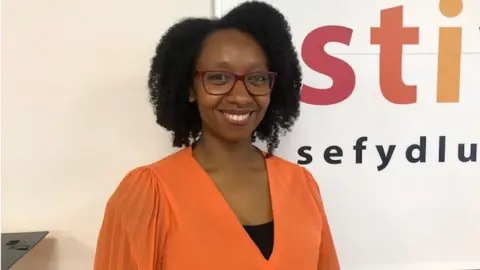Afro hair comb inventor hopes to inspire young black women
A woman launching an innovative new comb for afro hair wants to use her experience to get other young black women into engineering.
"I would have loved a young me to have been taught by a black woman," said Swansea-based Youmna Mouhamad.
She received an enterprise fellowship from the Royal Academy of Engineering to help her develop the product.
Fewer than 2% of engineers are women from ethnic minorities.
"I want to be part of the change, so that a young person that comes after me is in a place where they feel much more heard and much more accepted," said Youmna.
She was doing a PhD in physics when she first got the idea for the Nyfasi Deluxe Detangler, which provides an easier way of conditioning natural afro hair.
Youmna supported her studies by working as a nanny and the little girl she looked after used to cry with pain when her hair was washed and conditioned.
"The whole house would be full of tears," she remembers. "I wanted her to have a better experience.
"I shifted to engineering because I always had a desire to work on things that I can touch with my hands, and I love the process of taking an idea and actually creating something."

Once Youmna had developed a prototype she looked for women with afro hair to join a focus group to test it.
Lenient and her nine-year-old daughter, Goodness, were among the volunteers.
"I have got three girls and I do their hair myself," said Lenient.
"The washing process is dreadful because they don't want to. Why? Because it's quite painful for them, especially the combing part."
"And this detangler, the first time I tried it, it was really easy."
Goodness agreed, adding: "The normal comb feels like someone is pulling your hair, when it's tangled it hurts. But with this comb, it's very soft and easy to untangle."

While Youmna is excited about the rave reviews, she doesn't just want to launch a new business, she also wants to be a role model for other women from ethnic minorities to follow in her footsteps.
"My huge passion in personal development is actually empowering other people."
She says her experience as a black woman student in science and technology was difficult at times.
"When I was going through it, I thought it was me. I didn't think it was the environment.
"But when I spoke to other [black] students, it really got to me because it was like 'oh my God, you know, it's not you!'
"I never had a single black teacher, and that does a lot because of the simple fact of saying 'if she can be there, so can I'."

Youmna is being mentored in launching her business by Prof Dylan Jones-Evans at the University of South Wales.
He hopes Youmna's success will encourage more people from ethnic minorities into entrepreneurship in Wales and the rest of the UK.
"Many of them don't have the right role models, but slowly that's changing," he says
"I see Youmna over the next few years - and she is already - being a role model for so many people."
Another volunteer in the focus group, Charlotte Ajomale-Evans, said Youmna was already mentoring her.
"I just made friends with her and she's taken me on board and taught me a lot about developing and speaking out, especially in regard to racism."
"And she's also taught me to look after my hair, which is quite important."
